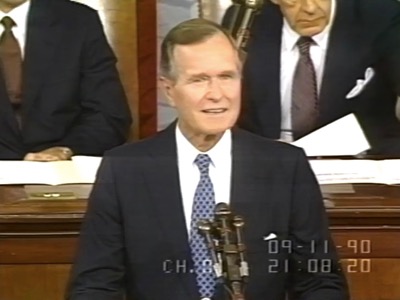For President George H. Bush, the aim of Operation Desert Storm was not so much to defeat Iraq as to establish a "New World Order", in agreement with the last President of the Soviet Union, Mikhail Gorbachev. It was about acknowledging the agony of the USSR and creating a world governed by the USA while guaranteeing the Soviets respect for their interests.

Thirty years ago, at dawn on January 17, 1991, Operation Desert Storm began in the Persian Gulf, the war against Iraq that opened the sequence of the post-Cold War wars. It was launched by the United States and its allies at a time when, after the collapse of the Berlin Wall, the Warsaw Pact and the Soviet Union itself were dissolving. This created an entirely new geopolitical situation, and the drew up a new strategy to take full advantage of it.
In the 1980s the US supported President Saddam Hussein’s Iraq in Ayatollah Ruhollah Khomeini’s war against Iran. But when this war ended in 1988, the US feared that Iraq would acquire a pre-eminent role in the region. So they once again pursued a policy of "divide and rule". They pushed Kuwait to demand the immediate repayment of the credit granted to Iraq and to harm it by exploiting the oil field underneath the two territories.
Washington led Baghdad to believe that the US would remain neutral in the conflict between the two countries; but when Iraqi troops invaded Kuwait in July 1990, Washington formed an international coalition against Iraq. A force of 750,000 soldiers, 70% of whom were American, under the command of American General Norman Schwarzkopf, was sent to the Gulf. For 43 days, starting on January 17, the US and allied air force, with 2,800 aircraft, carries out more than 110,000 sorties, dropping 250,000 bombs, including cluster bombs that released more than 10,000,000 submunitions. Alongside the United States, British, French, Italian, Greek, Spanish, Portuguese, Belgian, Dutch, Danish, Norwegian, Canadian, French, Italian, Greek, Spanish, Portuguese and British naval and air forces took part in the bombing. On February 23rd the coalition troops, comprising more than half a million soldiers, launched the land offensive. It ended on February 28 with a "temporary ceasefire" proclaimed by President George H. Bush (the father).
Immediately after the Gulf War, Washington sent an unequivocal message to its opponents and allies: "The United States remains the only state with truly global political, economic and military strength, reach and influence in any dimension. There is no substitute for American leadership" (US National Security Strategy, August 1991).
The Gulf War was the first war in which the Italian Republic participated under US command, violating Article 11 of its Constitution. NATO, although not officially participating as such, made its forces and bases available. A few months later, in November 1991, the Atlantic Council launched the "new Alliance Strategic Concept" in the wake of the new US strategy. In the same year in Italy, the "new defence model" was launched which, overturning the Constitution, stated that the mission of the armed forces was to "protect national interests wherever necessary".
Thus the Gulf War gave rise to the strategy that guided the successive wars under US command - Yugoslavia 1999, Afghanistan 2001, Iraq 2003, Libya 2011, Syria 2011 and others - presented as "humanitarian operations to export democracy". The millions of deaths, invalids, orphans and refugees caused by the Gulf War, which in August 1991 President Bush Sr. described as the "crucible of the New World Order", are testimony to the truth. In addition to these, one and a half million deaths, including half a million children, were caused in Iraq by the 12 years of embargo that followed, plus many more due to the long-term effects of the depleted uranium projectiles used massively in the war. And after that of the embargo, the new one caused by the second war against Iraq launched in 2003.
Thousands of billions of dollars spent on the war would be burned in this same "crucible": for the second Iraq war alone, the Congressional Budget Office estimates long-term US spending at around $2 trillion.
All of this should be borne in mind when, shortly, some people in the mainstream media recall the thirtieth anniversary of the Gulf War, "the crucible of the New World Order".

 Articles by this author
Articles by this author Send a message
Send a message
















Stay In Touch
Follow us on social networks
Subscribe to weekly newsletter